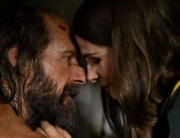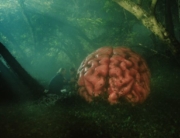The Halls (Guy Pearce and Kylie Minogue) are a poor family with six kids. The Joneses (Julian McMahon and Radha Mitchell) are the richest family in town with three kids. The Marshes (Jeremy Sims and Asher Eddie) have just two kids and do pretty well for themselves, just not as well as the Joneses. All of these families live on the same cul-de-sac in a small Australian town in 1975. The new film by riter-director Stephan Elliott (The Adventures of Priscilla, Queen of the Desert) is an account of his own upbringing, more than 40 years in the making.
First off, the title and the marketing for the film refer to the film’s delving into the ’70s phenomenon of swinging married couples. This might remind a lot of folks of Ang Lee’s 1997 film The Ice Storm, a stark look at the disenchantment of middle-class married couples and their children during the sexual liberation of the ’70s. It includes a scene where all the neighborhood parents attend a key party, in which everyone goes home with someone else’s spouse. Apparently when Elliott first saw Lee’s uber-serious drama (according to this interview), he could not believe how much it mirrored his own experience—only he wished Lee could have gotten to some of the humor inherently going on in that weird time in history. So Swinging Safari is actually Elliott’s response to The Ice Storm, which is essentially finding the funny in middle-class disillusionment.
Elliott’s film opens with a frenetic 13-minute montage that introduces all of the characters (and a beached whale) and gives us a heaping spoonful of what domestic middle-class life was like in Australia at the time (the parents drink wine out of a box or tall cans of beer all day long while the kids are left to fend for themselves). The Elliott stand-in is Jeff Marsh (Atticus Robb), who is not as outgoing as his neighboring peers, but his individuality is marked by his dream to become a filmmaker.
He and the other kids form a production company called “The Death Cheaters” and run around filming—you guessed it—cheap horror films. Melly Jones (Darcy Wilson), Jeff’s neighbor of the same age, has become a recluse as of late. The two have scars on their arms from an accident they were both involved in when they were younger. In a twin-like way, they are bonded with each other more than the other kids.
The film splits between the adult story and the children’s, who, despite a laissez-faire upbringing, end up becoming the casualties in their parents’ war. The aforementioned swinging does go down at a key party, the storied method of the men putting their keys into a receptacle and the women fishing one out, but not her husband’s. Once the swinging starts, it becomes clear that only two husbands and two wives out of the six actually want to sleep with each other. After that night, the families are never the same, and a prank war of escalating propulsion commences via montage.
Okay, we need to talk about Elliott’s use of editing. Swinging Safari is most easily compared to that style of a Scorsese film showcased in Goodfellas, Casino, and The Wolf of Wall Street. Especially the latter, because in Swinging Safari, once you think one montage is over, the film launches into an even longer, zanier one. Most of the movie is one, long, manic montage, with a chance for us to catch our breaths maybe once every five–10 minutes. The rapid pace and the very few full-on, drawn out scenes impair the film’s ability to create fully rounded characters as opposed to caricatures.
It’s filled with some pretty hilarious moments, such as the multiple stunts Jeff puts his neighbor through in the filming of his movies and the untimely and macabre death of a family pet. Yet Elliott gives us too much humor and not enough character moment. The quiet scenes between the montages come off as a bit too forced. We understand that Melly is battling depression and anxiety, but when she speaks, she states the themes of the entire film. Lines like, “Why are we so miserable if we have everything?” go so stridently against the guideline of show and not tell. Especially when there is so much show, the tell just feels out of place.
However, the design is top notch. The houses, the wardrobes, the hairstyles, are all meticulously period-accurate. The attention to detail coming off the screen pops like bubblegum. Even the lighting takes its cues from the time period. There are also a lot of nods to Jaws.
Swinging Safari did not get good reviews in its homeland. Perhaps its biting look at Australian life embarrassed some of the natives? (All the characters behave like total jackasses.) It’s a strange film, but maybe this is because some viewers aren’t used to seeing this much brazenness in one movie.

















Leave A Comment